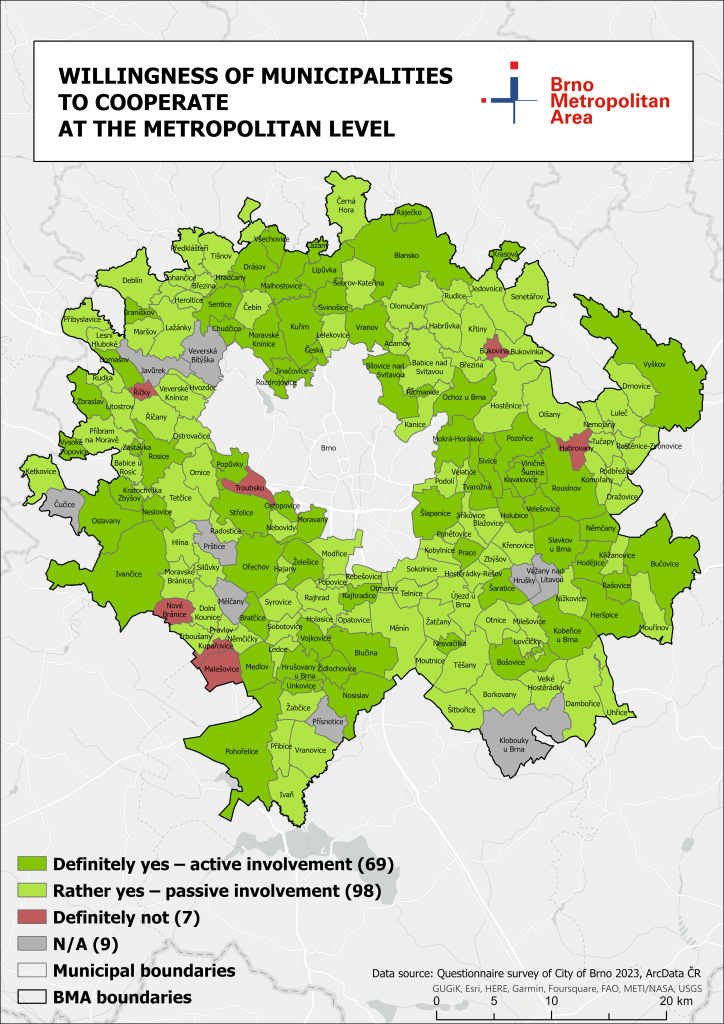Every three years, the City of Brno reaches out to all mayors of the municipalities of the Brno Metropolitan Area (BMA) with a request to complete a questionnaire. The goal of the questionnaire is to identify the opinions, needs and problems of all municipalities in the BMA in relation to the enhancement of metropolitan cooperation and its institutionalization. In the latest survey, representatives of all 183 municipalities in the Brno hinterland were contacted. The questionnaire was eventually filled in by 174 of them (95 %), and so the return rate remained at a high level similar to previous surveys, reaching 88 % (2017) and 96 % (2020) respectively.
The results of the last questionnaire in 2023 show that 91 % of mayors are interested in cooperation in the Brno Metropolitan Area and see it as meaningful. 88 % of mayors know that their municipality is part of the metropolitan area and perceive their municipality as part of Brno’s natural hinterland (residents of these municipalities commute to Brno for work, study, medical, cultural or other leisure activities). 93 % of mayors also perceive that coordinated development is beneficial and agree that strategic and spatial planning issues need to be addressed at the metropolitan level.
Municipal representatives would welcome solutions at the metropolitan level in terms of local accessibility (P+R parking, terminals, cycling), energy self-sufficiency, education, combating drought and erosion, and waste management. The results of the questionnaire showed that finance is not the key to engage in cooperation. Despite the fact that about 60 % of municipalities know about the Integrated Territorial Investment tool, from which they can get funds for their development and which Brno has been using for 10 years. Awareness of the benefits of metropolitan cooperation and the active approach of BMA municipalities is much more important for mayors.
Mayors were also asked to evaluate the development of cooperation with Brno. A large part of them, 40 %, evaluate the development positively and think that cooperation is improving. Half of the municipalities answered that they have found cooperation to be at the same level over the last 5 years. And what is the mayors’ message to the city of Brno? Don’t forget us – most of them agree that metropolitan cooperation in the future is threatened by the excessive dominance of large city and lack of communication. The mayors envision their involvement in metropolitan cooperation in the form of participation in various meetings and negotiations, cooperation on metropolitan projects, or sharing good practice.

Each time, the outcomes of the questionnaire are visualised in the form of maps and charts. The example from the latest survey is shown below. It represents willingness of municipalities to cooperate at the metropolitan level. Willing municipalities are shown in shades of green. In contrary, the red ones do not want to cooperate at the metropolitan level.
Detailed results of the questionnaire can be found here (only in Czech). The outcomes from previous questionnaire are available here (2017) and here (2020). These include other maps and charts.
The questionnaires and its outcomes are often used as a basis for the scientific articles. We can mention a few examples:
Cooperation differs. Intentions of municipalities towards metropolitan cooperation in post-socialist space – Brno, Czech Republic (the article can be downloaded here).
Size matters: Development and cooperation of municipalities in the Brno metropolitan area (Czech Republic) (the article can be downloaded here).
Along the path to metropolitan cooperation via metropolitan unit establishment: Case of Brno Metropolitan Area, Czech Republic (the article can be downloaded here).
Register your e-mail address to receive regular updates from the Brno Metropolitan Area.